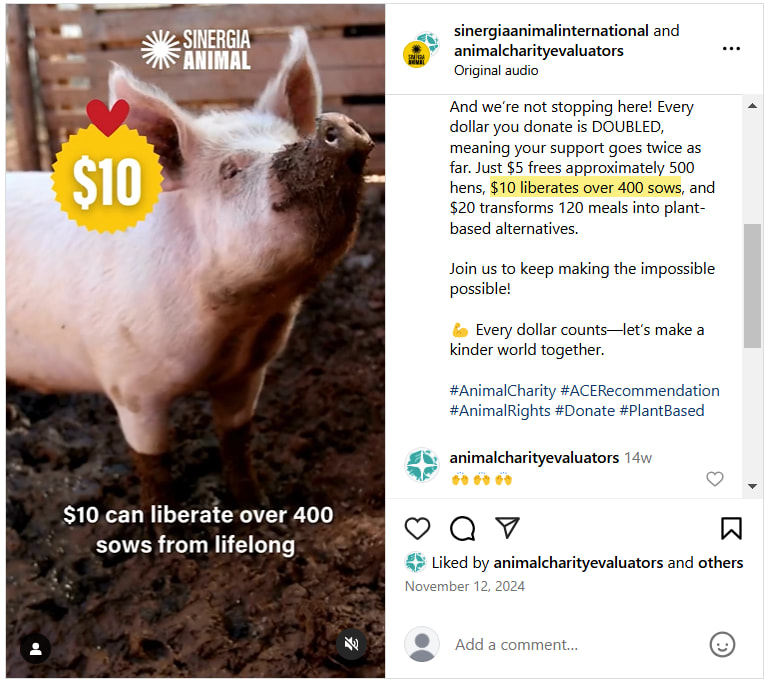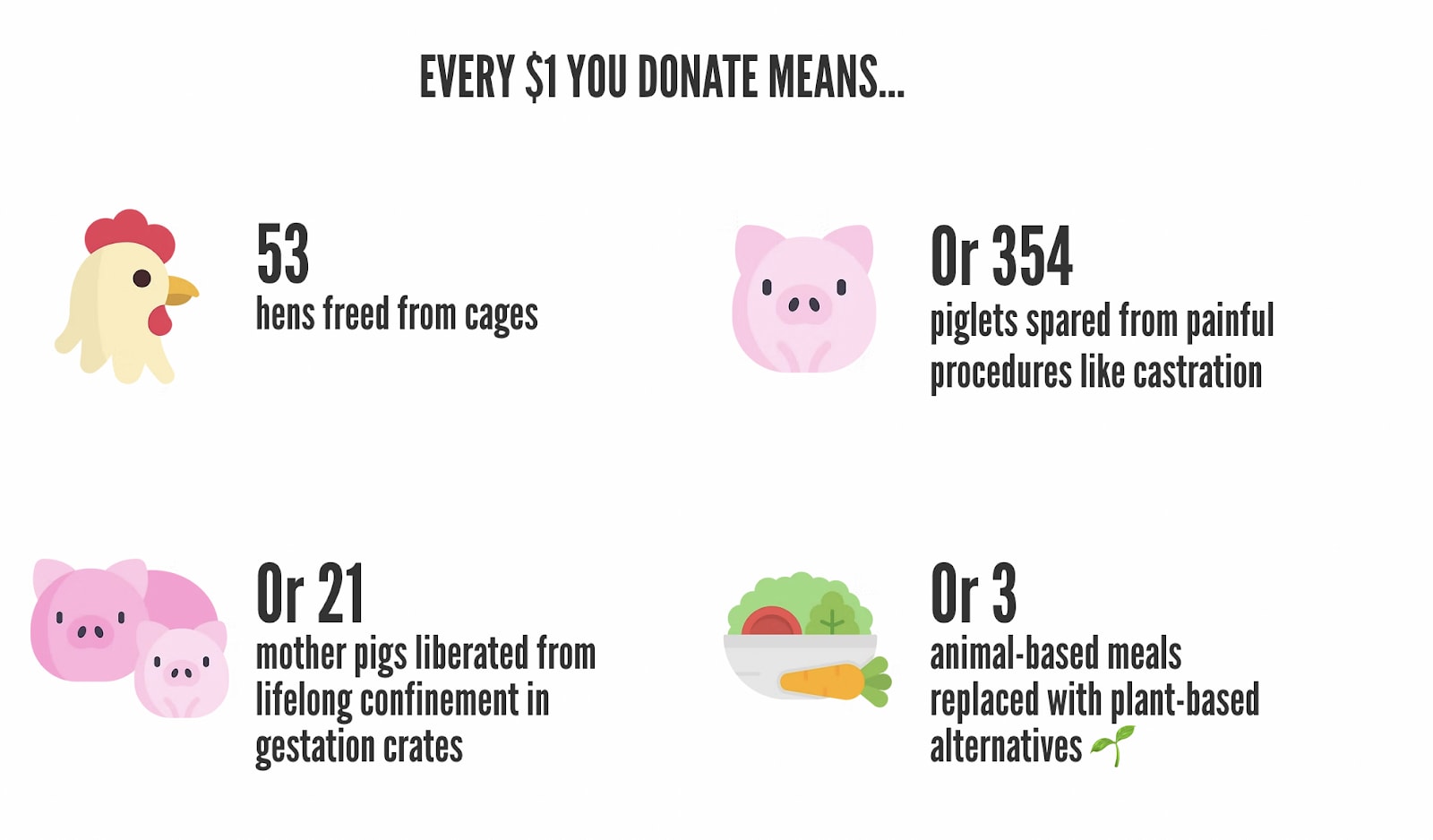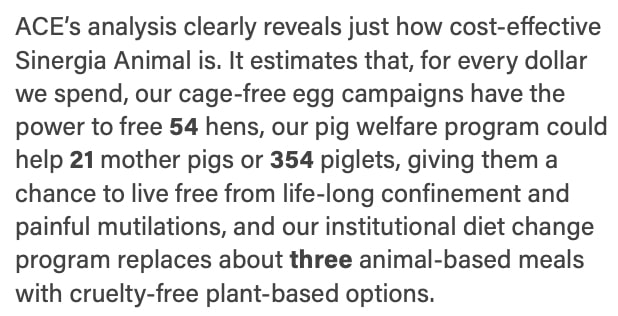Hi everyone,
Recently we discovered Sinergia has been making false claims about helping millions of animals.
We believe this is an important issue because Sinergia receives millions of dollars in grants from EA organizations. Just recently, Open Philanthropy awarded them a $3.3 million grant.
We hope you find time to read our article.




Note: this comment has been posted in response to both Vetted Causes’ first and second posts about Sinergia, as it addresses points raised in each.
ACE welcomes rigorous external evaluations of our work, as such feedback strengthens our ability to provide high-quality recommendations to donors and, ultimately, helps us maximize our impact for animals. To this end, we engage with external experts on a) our methodology for evaluations and grantmaking and b) on evaluations and grant reviews themselves. For instance, we interact with the EA and FAST forums and the Hive Slack channel, taking advantage of both solicited and unsolicited feedback. The strongest example of our commitment to engaging with feedback lies in GWWC’s evaluation of our programs.
The recent post by Vetted Causes is no exception. However, to balance the opportunity cost of engaging with this feedback with its potential to increase the quality of our work, we will first address the content of the concerns raised. We will then offer some suggestions for improvement of future reviews by Vetted Causes.
Regarding Vetted Causes’ specific claims about Sinergia, most of those claims have been addressed by Sinergia directly. We’d also like to note that while Vetted Causes refers to “ACE/Sinergia”, we’d prefer that we be treated as separate entities. Therefore, there are several notes we’d like to add that refer to ACE’s work specifically:
Issue 1
Alleged Commitment 1: Vetted Causes states, “in 2024, JBS stated that they still use ear notching due to ‘Difficulty in finding alternatives that ensure process traceability.’”
This report came out after ACE’s evaluation of Sinergia was completed, so it did not inform any part of our evaluation. Sinergia addressed the specifics of this claim in their response.
Issue 2
Alleged Commitment 2: Vetted Causes states, “Sinergia claims that in 2023, JBS published a commitment to not use gestation crates in all new projects, with a ‘Transition deadline’ of 2023.
As evidence for this claim, Sinergia provided a link to one of the JBS's animal welfare pages. However, the gestation crate policy that the alleged commitment references was already listed on JBS's website in 2020, and has been in effect since that point.”
In their second post about Sinergia, Vetted Causes also states, “Although Sinergia downplays this as a ‘minor mistake,’ it results in Sinergia receiving credit for helping millions of JBS's pigs who were not impacted. This is not a ‘minor mistake.’ Further, Sinergia claims that this mistake has been corrected, but all that was fixed was changing the phrase ‘by 2023’ to ‘in 2023’ in Cell K10. The impact calculations were not fixed, and still incorrectly credit Sinergia for helping millions of JBS's pigs who were not impacted.”
As Sinergia notes in their response, the number of sows reported for JBS includes those whose welfare may be impacted by the enforcement of the previous commitment.
In the process of double-checking our calculations with Sinergia, we noticed the same miscommunication that would have caused changes to our calculations. Although it would have been ideal to apply discounts at both the “number of animals affected” and the “SADs averted per dollar” levels, our SADs estimates were already conservative, and the magnitude of the change would not affect our decision to recommend Sinergia. Therefore, we are currently opting not to spend the time refreshing these calculations, as the changes could be quite involved.
Issue 3
Sinergia Claims That With $1 They can "Liberat[e]" 354 Piglets from "Brutal Confinement"
Vetted Causes states that, “ACE gave Sinergia credit for helping over 30 million female piglets through surgical castration commitments that Sinergia allegedly secured.”
Out of the two figures that ACE publishes for Sinergia’s pig welfare program (SADs averted per dollar and piglets affected per dollar), the former is correct because Ambitious Impact’s SADs calculations already take into consideration the "prevalence" of castration (which only occurs in male piglets). However, the latter indeed requires the same prevalence discount.
We have adjusted the estimates in the CEA spreadsheet for Sinergia’s pig welfare program. As a result, the impact estimate has been reduced from 354 piglets affected per dollar to 285 piglets affected per dollar. We have updated our review of Sinergia to reflect this change.
We would like to acknowledge that the difference in the cost-effectiveness of one of Sinergia’s programs (representing ~9% of expenditures) would not have had a determinative impact on our decision to recommend Sinergia. In fact, we believe we were conservative elsewhere in our estimates. For example, because Sinergia wasn’t able to provide estimates for the number of animals affected by three major commitments from food retailers and processors (Ceratti, Dia, and Habib’s in rows 7–9), we conservatively assumed that the number was zero. We remain proud to recommend Sinergia to donors and thank them for their excellent work.
Deletion of Column W
In their second post about Sinergia, Vetted Causes states, “Unfortunately, Sinergia/ACE deleted all of Column W right before Sinergia posted their response, and did not add any note stating that this column was deleted.”
During ACE’s evaluations of charities, we often redact information that charities provide us before publication on our website. In this particular instance, Sinergia had requested that we remove this column last year during their evaluation for confidentiality reasons related to their work, but we missed it in this particular case. This was not related to Vetted Causes’ review of Sinergia, but it was something that we noticed recently when double-checking our spreadsheet. We are not trying to hide any information; cell K10 states the change we made related to issue 2 above.
Improving Collaboration for Better Collective Results
We would like to take this opportunity to raise some questions about Vetted Causes' approach to evaluations and the publication of their reviews, as well as provide our perspective on them.
We believe that if Vetted Causes were to take a more collaborative approach, this would better serve our shared goal of reducing animal suffering as effectively as possible. We welcome continued discussion about how we can collectively improve our evaluation methods and maintain high standards of evidence while also acknowledging the complex realities of animal advocacy work.